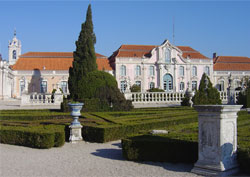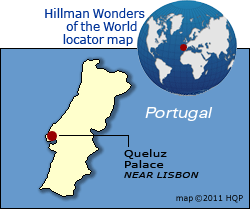



Queluz
National Palace
Travel tips you can trust


Why the
Queluz National Palace
is special
This complex is one of the last major Baroque structures built on the Continent. The Queluz Palace is a must visit for those keen on antique royal furnishings, portraits, and painted ceilings.
Top 3
Queluz National Palace
attractions
 Throne Room (Hall of Ambassadors)
Throne Room (Hall of Ambassadors)
It has an impressive ceiling painting and is profusely decorated with mirrors. The Ballroom sports two grand chandeliers.
 Royal Apartments
Royal Apartments
The Queen's boudoir and bedroom are visually striking, as are dining room and king's bedroom.
 Gardens
Gardens
The recently renovated formal gardens feature fountains, statues, and profuse greenery.
Other leading attractions
They include the Ballroom, Chapel, and Music Room.
More
Queluz National Palace
tips and insights
 Uses today
Uses today
 Housing
Housing
The Royal Guard barracks were converted into a guest house for visiting foreign dignitaries. And the Queen Maria Pavillion is now an upmarket pousada (inn).
 Event venue
Event venue
Classical music concerts and equestrian performances are held for the public.
 Dining
Dining
The large kitchen was converted into a quality restaurant.
 1934 fire
1934 fire
It devastated some key sections. They have since been restored.
 History in brief
History in brief
In the 18th century, a former hunting lodge was converted into a royal summer (then permanent) palace. Residents included the mad, politically toothless Queen Maria I.
 Location in Portugal
Location in Portugal

Know these Portugal tips and insights
Lisbon
Alfama
Belem Tower
Jeronimos Monastery
St George's Castle
Near of Lisbon
Alcobaca Monastery
Evora Historic Center
Obidos Castle & Town
Queluz National Palace
Sintra
North of Lisbon
Douro Valley
Oporto Historical Center
South of Lisbon
Algarve Coast
Azores
Madeira Islands
Photo by Husond - CC BY-SA 3.0


World's Top 100 Wonders
World's Top 1000 Wonders
Site map
My credentials
About my website and criteria
Reader testimonials



